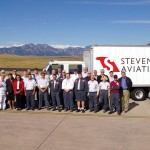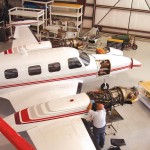By S. Clayton Moore
Changes are afoot at the growing Jefferson County Airport facility of fixed base operator Stevens Aviation. Led by a newly hired general manager with extensive experience in both jet aviation and FBO services, the company has expanded its menu of offerings. Those offerings include fuel service, as well as aircraft sales, maintenance, avionics, interior and airframe modification and other specialty services.
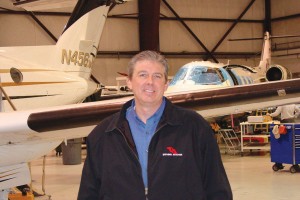
Mark Niehaus, who has held management positions at Bombardier, KC Aviation and AlliedSignal, was appointed as general manager of Stevens Denver in 2004.
It’s not a completely new direction for the FBO, but it has given this facility a new focus on communication, customer service and efficiency that is making Stevens Denver the crown jewel of the company’s western operations. Stevens Aviation has a long history in aviation services. Founded in 1950 as the J.P. Stevens Aviation Department, in Greenville, S.C., Stevens has grown to include locations in Donaldson and Greenville, S.C.; Dayton, Ohio; and Nashville, Tenn. The Denver location was purchased from TurboWest in 1994. Today, the company employees 487 people in 521,000 square feet of facilities.
Stevens has recently brought in new expertise, from the top down, starting with the appointment last March of Glenn J. Brown as president and CEO. Based in Greenville, Brown joined Stevens from prestigious Rolls-Royce, where he was vice president of aftermarket and customer service for corporate and regional aircraft. Brown’s focus on building infrastructure has complemented the ongoing efforts of Mark Niehaus, Stevens’ general manager in Denver.
Niehaus was appointed as GM of the Denver facility in October 2004. His 24-year aviation career has included positions as director of engine programs for KC Aviation/Gulfstream Aircraft Services and most recently as director of service, sales support and engine programs, for Bombardier Business Aviation Services. He’s spent the past year engaging staff and customers, closely examining the facility’s operations and envisioning new strategies to further the company’s success.
“I think Mark has brought a lot to the table for this group,” said Ray Houston, regional aircraft sales manager for Stevens Denver. “This operation has really come up a notch since he came onboard.”
Niehaus is pleased with the evolution the company has experienced while he’s been GM.
“We’ve made a lot of progress in the past year, largely based on two actions within the business,” he observed. “First, we broadened our services. When I came here, we were basically just doing maintenance. We’ve built the avionics side up and also built an interior shop. The second push is that we’ve taken a good look at the business and gotten focused on where we want to go.”
Special services
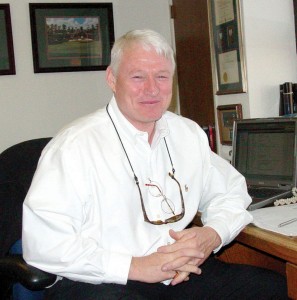
Ray Houston, a former Special Forces aviator and longtime commercial pilot, helps customers with both new and used aircraft sales.
The facility’s primary hangar encompasses 10,000 square feet and houses its administrative offices. It’s also home to Stevens’ interior department, which installs cabinetry, windows, soundproofing and other interior modifications, and the parts department.
Perhaps Stevens’ most unique offering is its composite repair and development department, which occupies a small workshop nearby. Led by Kevin Fornall, a miracle worker with composites, the shop has been a real lifesaver to customers across the country.
“If you can sweep it up, stick it in a box and send it to me, I can probably fix it,” Fornall laughed. “It’s not rocket science. It’s just a matter of experience.”
Tell that to the Citation customer who recently brought in a broken flap. The part was sent to the manufacturer, who rejected it as an unacceptable repair and recommended the purchase of a replacement part. Instead, it ended up in Fornall’s shop, where he was able to repair it for one quarter of the replacement price.
“It’s another one of the value-added pieces we brought in,” Niehaus said. “We knew this was going to be a good opportunity, because we keep seeing more and more composite materials coming in on aircraft.”
The trick is to make the customers aware that the service is available.
“It’s good information, but it gets forgotten over a period of time because they don’t need this service today,” Fornall explained. “They don’t think about it until something breaks. People don’t understand what we’re capable of doing until they actually see it done. It’s something we want to pursue and integrate through other departments.”
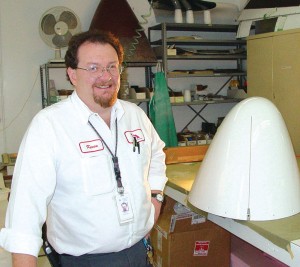
Kevin Fornall supervises the inspection, repair and fabrication of composite structures for customers.
Stevens’ secondary hangar has 22,000 square feet and houses its extensive maintenance operations and paint shop. It provides inspection and maintenance services for a wide range of turboprop and jet aircraft. The facility is an authorized service center for the full line of Beechcraft and Raytheon aircraft, as well as Learjets, Cessna Citations, Hawkers and the Italian Piaggio Avanti.
“This facility has a good history with turboprop customers; we wanted to add to that by bringing on more jet work,” Niehaus said. “We don’t really differentiate between the two classes of customers.”
In order to augment the FBO’s inspection and maintenance capabilities and take on more jet customers, Niehaus increased his staff by about 15 percent over the past year. He added four people to the FBO’s avionics department and another eight in maintenance that he recruited from Bombardier’s jet facilities at Centennial Airport and Denver International Airport. The entire Stevens Denver location has grown to 73 employees.
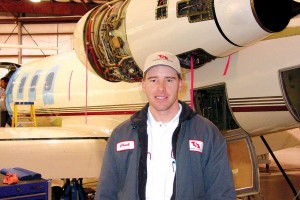
Charles Masin, the company’s shop foreman, supervises inspections for Learjets, Beechjets, Hawkers and many other corporate and private jets.
“The hardest part of building a business is finding people that know the product,” Niehaus said. “We’re very lucky here. We already had a base of people who have been working on pistons and turboprops here for 20 years. Now we have a group of people with good depth of experience in jets as well. It’s not me that sells the customer. It’s the work they get done on their aircraft.”
The maintenance shop has been busy these days with both regular maintenance and pre-buy inspections of both new and used aircraft. Staff recently completed a massive 12,000-hour inspection of a Learjet from Alaska, completing the formidable workload a day under schedule.
“You have to get your name out there and make customers happy,” said Chuck Masin, the shop foreman. “It’s getting busy in a hurry.”
The customer is always right
Stevens’ Denver facility is considering charter operations in the future, but much of its focus right now is on new and used aircraft sales. The facility has the dealership for Beechcraft products for seven states including Colorado, Utah, Montana, Idaho, Wyoming and parts of Kansas and Oregon. They’re increasing their advertising and starting a bigger push to sell more airplanes this year.
“This dealership has been present here since day one,” Houston said. “These aircraft are on the field so potential customers can come see them in person. We’re seeing a lot of people who are ready to take a look at Beechcraft now that they have Garmin avionics in place. That’s going to make a big difference in sales.”
What often seals the deal is the extensive network of support that Stevens offers.
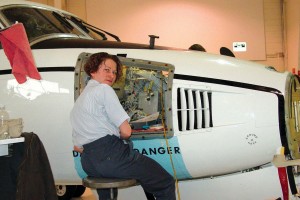
Katja Kusterko-VanCleave works on an aircraft completion in Stevens Aviation’s 10,000-square-foot primary hangar, which is also used for interior modifications.
“While Stevens only has five locations, they’re extremely large locations,” Houston said. “When we deal with a customer, it’s not just a mom and pop facility. A network is in place, so if you get in trouble, other facilities across the nation are there to help you out.”
Stevens offers off-site maintenance to get an aircraft back in the air in a hurry. On request, the company will send a mobile repair team in a fully stocked diesel-powered truck as a service of Stevens Aviation Maintenance Mobile.
Niehaus said in order to be successful, it’s important that all the departments in the company work together in an integrated fashion.
“We’re trying to grow all the services in this company, because I think it makes you more competitive,” he said. “There’s a lot of synergy between aircraft sales and all the other aspects of this operation, especially when it comes to bringing customers in and keeping them. We’re very focused on developing a consistent customer base. I’ve told the salesmen that if they bring in the customers, we’ll do what we have to in order to keep them. Then, they can go get new ones.”
That commitment to customer service after the sale is what breaks the tie for many aircraft sales customers, according to Houston.
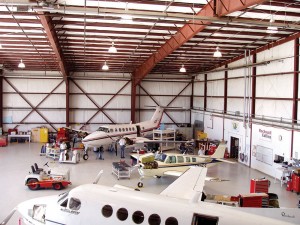
Stevens Aviation’s 22,000-square-foot hangar is already cramped for space. The company hopes to have a new hangar constructed by 2009.
“It’s the best,” he said of the Stevens network. “When you have the capability to provide a great product, and the service afterwards, it’s a big deal to customers. With our full line of services, they can step in as an owner and not have to worry about the management of the aircraft so much. They just pick up the phone and call us and everything gets handled for them.”
Niehaus’ common-sense experience is largely responsible for this unique attitude towards the work.
“We truly feel like we have to earn each customer’s business,” he said. “At the end of the day, the customer’s perception is the only reality that counts. You can try to rationalize a million different reasons why the customer is wrong, but he’s the only one making the decision about where to spend his money.”
Niehaus is a hands-on boss. He walks the floor of both hangars a couple of times a day, not only to observe operations, but also to make himself approachable.
“What I’m aiming for here is the mentality where our staff doesn’t have to run for cover if a mistake is made,” he said. “If there’s an issue, I want our people to feel comfortable about approaching me so we can do something about it together. If no one gets their head chopped off over one mistake, people are more likely to say something so we can get things squared away. The trick is knowing you have a problem; then you can decide whether you’re going to leave it as lemons or make lemonade.”
Staff has taken the message to heart and the company is succeeding on many fronts. Not only is turnover low, but the facility also has been profitable in the past year. The upswing in business also pleases its employees.
“I really like it,” said Patrice Fenton, whose role as concierge makes her the front line of defense for the entire facility. “There’s a lot of change and you don’t always know what’s going to happen from one moment to the next, so when it’s busy, we’re really rocking and rolling. It’s a real pressure cooker, so you really have to have your act together, but it keeps you on your toes.”
Bigger and better
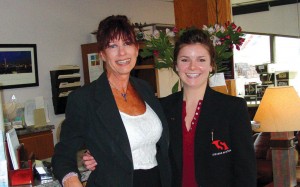
Patrice Fenton (left) and Sam Pire provide first-class concierge services to Stevens Aviation’s solid base of customers.
Stevens is feeling the pressure to expand as well. The nearby Interlocken Business Park suffered high vacancy rates during the past few years because of the failure of many software and Internet companies. However, as the economy recovers and new businesses move into the area, the need for corporate aircraft services is rising steadily. Niehaus is acutely aware of the need and is growing his business at a steady but cautious pace.
“We really want to grow everything very deliberately,” he said. “We’re fighting space problems, but that’s a good problem to have.”
Stevens just added its secondary hangar in 2002, but is already considering adding an additional hangar to expand its services.
“You put three or four King Airs in here, and it can get a little cramped,” admitted Scott Bell, maintenance crew lead, who has been at the facility since 1986. “It will be nice to have some extra space.”
The company hopes to add a third hangar by 2009, possibly as large as 50,000 square feet, depending on the parent company’s commitment and the availability of space at the airport.
“Whatever you build for hangar space, in five years it won’t be enough,” Niehaus observed. “A lot of people would like to bring their aircraft here for storage as well. If you build the hangars, they will come.”
Stevens competes with Denver Air, the largest FBO at Jefferson County Airport. Denver Air is one of a number of recent acquisitions in the FBO portfolio managed by Ross Aviation.
“I’ve seen a real mix of customers and what they want out of their FBO,” Niehaus said. “They come to us not just because it’s convenient, but also because we really try to deliver the highest level of customer service we can bring. We would like a beautiful new facility, but we’re not quite there yet, so we put a heavy focus on service.”
Nonetheless, Stevens maintains a healthy relationship with Denver Air as well as all the other companies on the Jeffco field.
“There’s a competitive relationship, but it’s by no means adversarial,” Niehaus said. “When there are situations that make sense for the airport, we help each other out. If it’s good for the airport and allows it to grow, we need to take care of it, because this is our common ground.”
Some of that competition comes down purely to aircraft fuel, a necessary commodity to any aircraft owner. Stevens has fueling arrangements with several companies on the field, including several flight schools, but also draws customers from across the region, including the military, the National Center for Atmospheric Research and the U.S. Forest Service.
“We find it comes down a lot of times to a tank of fuel,” Niehaus said. “If an owner can make it here on a tank of fuel, we can usually get them to come here as customers for other services. Giving discounts on fuel is one of the advantages we have. We have a few maintenance customers for whom we can cut those kinds of deals and if they need upgrades for their aircraft, we can do that, too.”
Despite the challenges inherent to running what’s essentially a self-contained enterprise, Niehaus is pleased to be out of the corporate world and back in an entrepreneurial role.
“I enjoy having the latitude here, where if we need to do something special for a customer, we can do it,” he said. “When you have to get permission to make decisions, you’re not as agile in the market and you’re not as responsive to the customer as we could be. As long as the business continues to grow, everybody is happy.”
To keep maintaining that bottom line, Niehaus intends to maintain the company’s sharp focus on pleasing its customers.
“In going forward, there’s a lot of competition on the different products that we offer, so my challenge is to make sure we’re treating out customers well,” he said. “That alone will keep a customer coming back to us time and time again. If we can do that on the fuel, maintenance and avionics fronts, the business will work.”
For more information about Stevens Aviation, visit [http://www.stevensaviation.com].
- “This is the one facility that is poised to make the most advancements, because of the people we have in place,” said Ray Houston, sales manager. Employees of Stevens Aviation have an average tenure of 15 years.
- Stevens Aviation treats turboprop, piston and jet customers with the same level of customer service.












